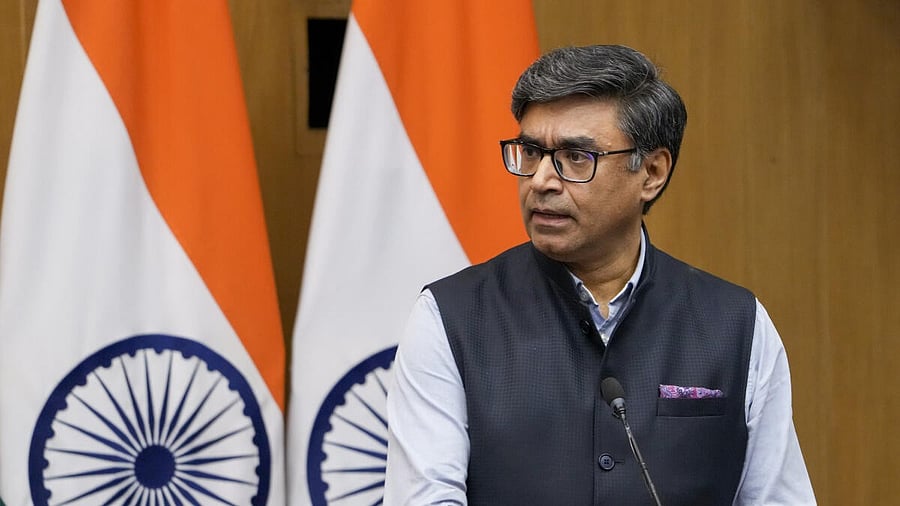
India's Foreign Secretary Vikram Misri.
Credit: PTI Photo
Foreign Secretary Vikram Misri was India's face during the recent conflict with Pakistan. Attacking him personally can, therefore, be framed as an attack on the country. It is also an undermining of all the values that India foregrounded in its battle with Pakistan. For this is also an ideological and civilisational contest, beyond being strategic and military.
It was after the announcement of a ceasefire with Pakistan that Misri, with 35 years of experience, was subjected to online trolling that extended to his family, particularly his daughter. She was targeted following claims that in her professional capacity, she may have provided legal assistance to Rohingya refugees who are Muslim from Myanmar.
Even if she did so that is hardly against any law; but it shows a human empathy that organised hate-mongers do not like. The trolling escalated to the kind of viciousness where private photographs and contact details were reportedly shared, making it a combination of vicious online threats and a security risk in a heightened atmosphere.
Misri should ideally file a police complaint and/or the government should put investigative agencies on the job of locating the trolls and book them under various sections of the law to send a message. This case can be a precedent for having a legal framework — if that happens.
First, let’s get some context. Once the operation against Pakistan began, India made it a point to showcase secularism as a higher value to the nationhood created on the Two-Nation theory (that Hindus and Muslims make separate nations) that underpins the existence of Pakistan. The reason battles have been fought over Kashmir is because of its Muslim majority.
During the recent conflict, India smartly posited two women officers, one of whom was a Muslim, to give the early military briefings. That Muslims are participants in all aspects of Indian life can also be seen in the fact that among the casualties on the Indian side was that of sub-inspector Mohammad Imtiaz of the Border Security Force, a Bihar native.
But why was the foreign secretary targeted over the ceasefire and not the prime minister or India’s political leadership? One can speculate that a section of the online trolls has a psychological framework in which their masculinity, Hindu Rashtra, and India’s greatness are intertwined, and the greatest satisfaction comes from Muslim bashing. All charged up by the nonsense rhetoric in TV studios and frantic WhatsApp forwards, they were disappointed that India announced a cease-fire without ‘flattening’ Pakistan.
Indeed, in an episode that has tragi-comic aspects, after the attack on Karachi port and flattening of Islamabad turned out to be fake news, on May 12, a group of men wearing saffron scarves landed up at Hyderabad’s famous Karachi bakery where they vandalised the store and demanded a name change. Never mind that the famous bakery is owned by a Sindhi Hindu family that migrated from Karachi in 1953.
Considering there is a Hyderabad in Sindh, Pakistan, and in Telangana, India, one can only wonder at the cretins who make up the mob.
The schizophrenia of claiming secularism while frequently abandoning it, has no doubt contributed to nurturing these noxious individuals who live out their fantasies both in the real world and on social media. According to data collected by the Association for Protection of Civil Rights (APCR), 184 hate crimes were reported across India after the Pahalgam terror attack, from April 22 to May 8. There were 84 hate speeches, 39 assaults, 19 vandalisms, and three murders in this period, the report states.
Misri became a target because he walked the path of reasonableness during the conflict — and Right-wingers just hated that. Indeed, fantasies and fake news had intruded into the public consciousness in both countries, where psychological warfare was also used.
Never mind that the fundamental India-Pakistan problem remains unresolved.
Since the Pahalgam attack, there’s been a mob at the doors baying for blood, and they are ready to attack anyone who comes in the way of their hate fantasy — be it a widow of a victim murdered in Pahalgam, Himanshi Narwal, or a career bureaucrat speaking for India.
What’s also noteworthy is that a lot of this aggression is passed off as national purpose by those who see themselves as MIGA (Making India Great Again) just like the gun-toting racists in the United States who describe themselves as MAGA (Make America Great Again).
The polished face, therefore, presented to the world, as seen in the foreign secretary, can be at odds with the mob that’s been created out in the street.
Saba Naqvi is a journalist and author.
Disclaimer: The views expressed here are the author's own. They do not necessarily reflect the views of DH.